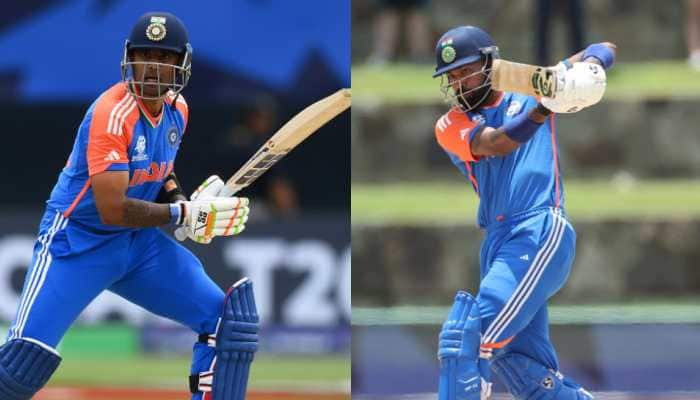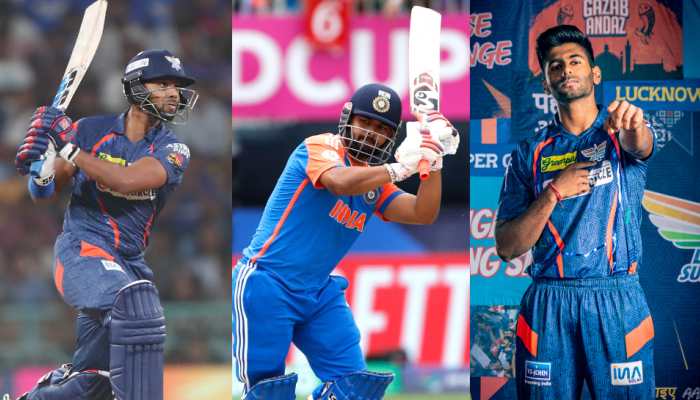Commonwealth Games 2018, Hockey: India got what they wanted in an English spine-chiller
Both teams were already through to the semi-finals. But to say that it left nothing at stake would be like somebody caught napping at work.
Trending Photos
) Twitter
Twitter New Delhi: Five of the seven goals in the last 9:02 minutes. Winning strike in the last two seconds. India beat England 4-3. Even 'Breathtaking' would not do justice as a title to the roller-coaster hockey script that rolled out on Tuesday in Gold Coast. It had its heroes, of course: a selfless Mandeep Singh, a Manpreet Singh who came of age and an SV Sunil, the leader in disguise.
At 1-1, with just a few tik-toks and 9 minutes left, the ball flew off Rupinder Pal Singh's dragflick and survived a couple of speed-breakers before entering the English goal. From there on, the last Pool B match of 2018 Commonwealth Games (CWG) was like experiencing a nine-minute 7D movie. But it wasn't 'Virtual Reality'. Twenty-two men on the pitch, and their mates biting nails in the dugout, had to pull out all reserves to rein in the nerves. In the end, it was India who did that better, and won.
Both teams were already through to the semi-finals. But to say that it left nothing at stake would be like somebody caught napping at work.
You play to win, without bothering what comes along with it. But here, the teams were bothered – for a win would mean avoiding five-time defending champions Australia in the final. A hurly-burly dugout and the players’ palpable nervousness to find the winning goal was a result of that.
India coach Sjoerd Marijne didn't hesitate admitting that it mattered who they face in the semi-finals, while maintaining that their primary focus was to "play better".
"We were not talking about this (semi-final opponents). We wanted to play better than the previous matches and in the end we would see who we are going to play. (But) If you could choose to play the world No. 1 (Australia) or the No. 9 (New Zealand), who would you (want to) play?" Marijne said talking to Zee Media from Gold Coast.

India have lost the last two CWG finals to Australia, which are also their only two medals (silver) at the Games. So the wariness to avoid the hosts could be felt in both camps, before Manpreet played a master long-ball that proved decisive.
At 3-3, the clock showed just five seconds left. Manpreet had the ball and spotted Mandeep hovering on top of the English circle. The captain put all his power in the slap-push and directed it to perfection. To Mandeep's credit, he managed to brush the ball with his stick. England referred the decision, but the video umpire spotted Mandeep's deflection; 4-3, India won.
The winning moment always stays fresh; but the play of the game, and what perhaps showed the team's united desire to win, was how Mandeep set his skipper up for India's equaliser in the 33rd minute.
Gurjant Singh pounced on a mis-pass and fed Mandeep inside the circle. Quickly realising he wasn't in position to have a shot at goal, the junior World Cup-winner set the ball like a dinner plate for Manpreet to push it past the English goalkeeper.
More than the equaliser, the way it was scored re-ignited India, even though England kept coming back to keep the Indians under pressure.
The victory also maintained India's unbeaten record in the tournament with 3/4 wins, besides the 2-2 Pakistan draw. While it appears dominant, it doesn't paint the correct picture.
Against Pakistan, the Indian defence allowed pressure to pile up in the dying moments. It led to penalty corners and eventually a successful one that gifted a point to the neighbours.
Against Wales, the team saved itself the blushes before scraping a 4-3 win. The Welshmen surprised the Indians with tight marking and space-cutting strategy. It slowed India's pace, made the midfield less fluid and blunted India's counter-attacking strength.
A 2-1 scoreline against Malaysia after that confirmed India's entry into the semis but the run has been far from convincing.

In fact, India's performance led coach Marijne to say that the team isn't playing like the last five months, in which it won the Asia Cup as well as the Hockey World League bronze.
"If every player brings his level up, the team will perform," Marijne said. "So I and (analytical coach) Chris Ciriello were busy helping them get back in the right mindset."
But he refused to elaborate further, stressing on the fact that the players need to know how to "deal with" the low points and lift themselves up.
"I know you would like to know how (we came back from the Welsh scare), but what’s important to understand is that every player has ups and downs, and it is crucial how they deal with the downs," Marijne explained.
New Zealand have been on a goal-scoring spree with 18 so far. The form of their strikers will test the Indian defence that has the most goals against (9) among the four semifinalists.
Perhaps, the Indians would instead want to focus on the difference in pace they generated against England compared to the three matches before that. Fast suits India. Their counter-attacking strength gets oppositions thinking. And if India pulls those counters off, it rattles teams.
To round it up, India now have what they wanted – New Zealand in the semi-final. Now if Akashdeep Singh can come out of the lull to match Sunil’s form, Rupinder can rediscover his success on dragflicks and Manpreet can continue to inspire like he did against England, the Black Sticks will have a lot more they can handle. Otherwise, it could be an even game.
To top it up, there may be a surprise or two waiting for the New Zealanders. Marijne dropped that hint when asked about under-utilizing Varun and Amit Rohidas on penalty corners.
“The tournament is not finished yet. So we will see.”
Stay informed on all the latest news, real-time breaking news updates, and follow all the important headlines in india news and world News on Zee News.
Live Tv







)
)
)
)
)
)
)
)
)
)
